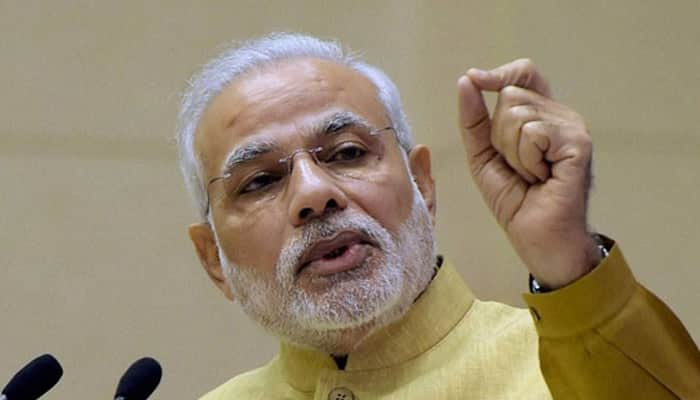Hazaribagh: Prime Minister Narendra Modi on Sunday called for second Green Revolution, saying it should start immediately from eastern India.
He said Indian agriculture has been lagging in several areas including inputs, irrigation, value addition and market linkages and his government was committed to modernizing the sector and making it more productive.
"We have seen the first Green Revoltuion but it happened several years ago. Now it is the demand of time that there should be second Green Revolution without any delay. And where is it possible? It is possible in eastern UP, Bihar, West Bengal, Jharkhand, Assam, Odhisa," Modi said while laying foundation stone of Indian Agricultural Research Institute at Barhi.
"That is why the government is focusing on the development of this area. For that we have started this research institute," the Prime Minister said.
He said urea plants in this area have been closed and a decision has been taken to reopen them as farmers will need fertilizers.
Emphasising the need for use of scientific methods for farming to increase productivity, Modi said "Unless we prepare a balanced and a comprehensive integrated plan, we will not be able to change the lives of farmers."
Pitching for 'per drop, more crop', Modi stressed the need for research in the field of agriculture to determine the health of soil and its needs in terms of seeds, water quantity, amount of fertilization etc.
He said the government was taking steps to train youth in soil testing so that such labs could be set up on the pattern of pathological labs for humans. "This will also lead to job creation," he added.
Turning to pulses, he said India has to import these because of shortfall in production and noted that a special package has been given to farmers engaged in cultivation of pulses.
"The production of pulses in the country is very low and I urge farmers that if they have five acres of farming land, use four acres for other crops but cultivate pulses on at least one acre," Modi said.
The Prime Minister said that a process had began to help farmers maintain land by issuing "soil health cards", quality seeds, providing electricity, irrigation and giving them a proper market with value addition.
"If there is no change in village economy, we cannot change lives of farmers. So the Centre's endeavour is to introduce additional farming system to increase agricultural produce per hectare, which is now a cause for concern," he said.
"But, there are ways (to address it) through government policies and training resource availability", he said.
Expressing concern over a growing population and the shrinking land resources because of the fragmentation of land, he said, "Fifty years ago, a family used to have 50 bighas (about 20 acres) of land and now it has reduced to only two-three bighas because of the division of land (following family structure)".
He expressed concern that if agricultural production was not increased in the country, there would be a shortage of grains and it would affect the economy of farmers.
"Students (coming) from far off areas (to IARI) will go to their respective regions and help farmers (through their research)," Modi said.
In addition to the research institute being set up, Modi said, reviving the fertilizer factory in Jharkhand's Sindri and setting up of new ones in Bihar and Bengal would help farmers get much-needed fertilizers and urea, which in turn would create employment opportunities for the youths.
On fertiliser plants, Modi said the government would revive sick units and set up new ones with investments of thousands of crores of rupees to ensure that farmers get fertiliser on time so that crop production could be increased.
Modi said urea plants would be revived or set up in states like Bihar, West Bengal, Uttar Pradesh, Jharkhand and Assam.
The Union Cabinet has already approved the revival of two shut fertiliser plants in Uttar Pradesh and Bihar at an investment of up to Rs 12,000 crore and by making use of the proposed 2,000-km gas pipeline from Jagdishpur to Haldia.
These moves by the Centre would ensure adequate availability of fertilisers to farmers besides generating employment for local youth.
He also said there is growing awareness among farmers about how to increase productivity as they are adopting vermicompost for this purpose.
"It will save the fertility of the land and reduce consumption of urea. Excessive use of urea is spoiling the fertility of soil," he added.
He further said that the Kisan Channel should act as an open university for farmers in terms of guidance and proper knowledge for better agricultural techniques.

















